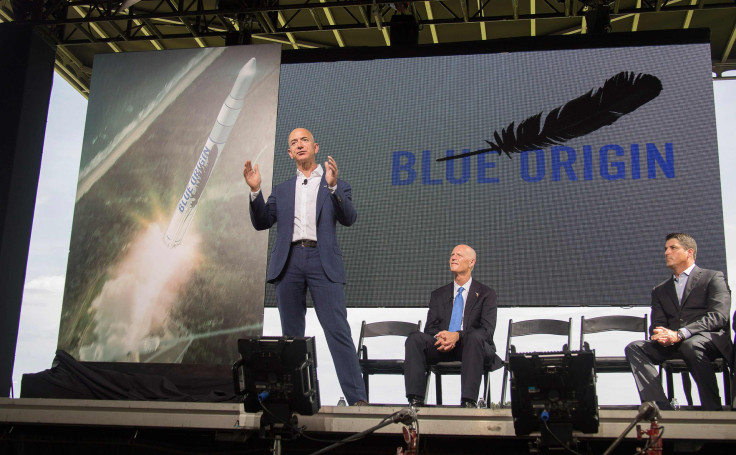Jeff Bezos' Space Company Blue Origin Gets A Launchpad In Cape Canaveral, Florida

The so-called Space Race 2.0, which has seen the involvement of companies like Elon Musk’s SpaceX, Richard Branson’s Virgin Galactic and Boeing Co., now has another participant. Amazon.com Inc.’s founder Jeff Bezos announced Tuesday that his secretive space technology company Blue Origin will set up shop at Florida’s Cape Canaveral air force base, where it will build and launch rockets into orbit “later this decade.”
“Our new home on the Space Coast is anchored by the launch site at Complex 36,” Bezos said at a press event in Cape Canaveral. Complex 36 has been the site of several historic launches, including the Pioneer, Mariner and Surveyor space probes. “The site saw its last launch in 2005 and the pad has stood silent for more than 10 years -- too long. We can’t wait to fix that.”
SpaceX and the United Launch Alliance -- a joint venture between Lockheed Martin Corp. and Boeing -- are already using nearby launching pads at Cape Canaveral.
“One of the unique things about our Florida operations is that we aren’t just launching here, we’re building here,” Bezos said. “Our American-made BE-4 engine -- the power behind our orbital launch vehicle -- will be acceptance tested here.”
The new facility will create 330 jobs and help invest $200 million locally, the New York Times reported, citing state officials.
Blue Origin’s flagship rocket is called the New Shephard -- a suborbital launch system designed to carry people into space using a reusable booster system. However, when the rocket was first tested in Texas in April, the propulsion module failed to function as expected and was eventually lost.
“In fact, if New Shepard had been a traditional expendable vehicle, this would have been a flawless first test flight. Of course one of our goals is reusability, and unfortunately we didn’t get to recover the propulsion module because we lost pressure in our hydraulic system on descent,” Bezos said, in a brief statement in April.
The company’s attempts to build a reusable propulsion module are similar to SpaceX’s as-of-yet unsuccessful efforts to land the first stage of its Falcon 9 rocket on a floating platform.
Bezos did not mention the exact time it would take for the company’s rockets to be ready for launch.
“I don’t know how long this will take, but one day I look forward to having a press conference with you guys in space,” he said at the press conference.
© Copyright IBTimes 2025. All rights reserved.





















